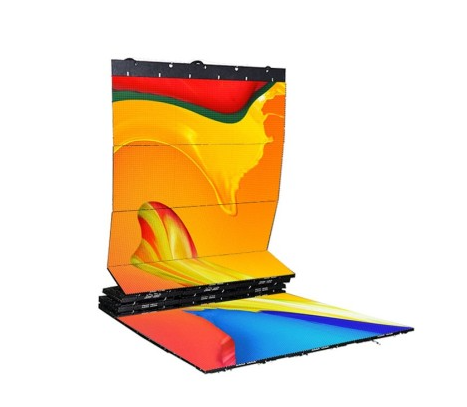What is flexible LED screen?
Flexible LED screens, revolutionizing visual displays, are innovative technological marvels. These screens, characterized by their bendable nature, redefine the traditional concept of display panels. But what exactly is a flexible LED screen?
Emerging from the convergence of cutting-edge materials science and display technology, flexible LED screens boast a malleable structure that allows them to bend and curve without compromising visual quality. Unlike rigid LED panels, these flexible counterparts offer versatility in installation, enabling seamless integration into various environments and applications.
The genesis of flexible LED screens traces back to the pursuit of overcoming the limitations posed by traditional flat-panel displays. Researchers and engineers sought to develop displays that could adapt to unconventional surfaces and configurations while maintaining high-resolution imagery. This endeavor led to breakthroughs in materials engineering, with the development of flexible substrates and conductive materials conducive to bending and flexing.
The journey towards realizing flexible LED screens involved rigorous experimentation and refinement. Engineers explored various fabrication techniques to ensure the durability and reliability of the flexible display modules. Advanced manufacturing processes such as roll-to-roll printing and thin-film deposition enabled the mass production of flexible LED panels with uniform performance characteristics.
Suggested reading:How to Choose Fast Recovery Diode Wearables?
ODM Small Signal Switch Diode vs. Standard Diodes: Key Differences
Why Choose Schottky Diodes for Efficient DC Rectification?
What factors influence buyers in diode selection?
Understanding ODM General Rectifier Diode: Functions and Applications Explained
Are High Voltage Diodes Safe for Your Application?
Understanding Fast Recovery Rectifiers: Benefits, Types, and Applications
Furthermore, the proliferation of flexible OLED (Organic Light-Emitting Diode) technology played a pivotal role in advancing flexible display solutions. OLED's inherent flexibility and self-emissive properties complemented the design requirements of flexible LED screens, facilitating the development of ultra-thin and lightweight display modules.
The significance of flexible LED screens extends beyond their technical prowess; they represent a paradigm shift in visual communication and design. By transcending the constraints of rigid displays, these flexible screens empower architects, designers, and marketers to unleash their creativity in unprecedented ways. From immersive curved installations in retail spaces to dynamic architectural facades, the possibilities are limitless.
Moreover, the adoption of flexible LED screens heralds a sustainable future for display technology. Their lightweight and energy-efficient design not only reduces material consumption but also lowers operational costs over the long term. As businesses and industries embrace sustainable practices, flexible LED screens emerge as eco-friendly alternatives to conventional display solutions.
In conclusion, flexible LED screens epitomize the convergence of innovation and functionality in the realm of visual displays. From their inception through relentless experimentation to their transformative impact on design and sustainability, these screens embody the spirit of technological advancement. As they continue to evolve, flexible LED screens will shape the landscape of visual communication, ushering in a new era of dynamic and immersive experiences.
How Schottky Diode AC Rectification Solves Efficiency Issues
Unlocking OEM Ultra Fast Diodes: Your Key to Efficient Power!
Say Goodbye to Downtime: Unleashing the Power of ODM Ultra Fast Recovery Diodes
- Previous: The Advantages of Implementing Dual 8 Inch Line Array Systems
- Next: None


